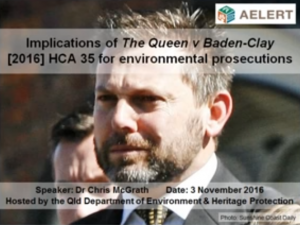
PODCAST: Dr. Chris McGrath presents "Implications of the R v Baden-Clay [2016] HCA 35 for environmental prosecutions".

What does one of Queensland’s most notorious murder trials have to do with vegetation clearing? How are Baden-Clay’s actions on the night of the murder and afterwards relevant to trying to prove the take of a natural resource in a national park?
The High Court’s recent decision in R v Baden-Clay [2016] HCA 35 has important implications for environmental prosecutions particularly where circumstantial evidence such as post-offence conduct is relied upon to establish the guilt of an offender.
Environmental compliance officers, investigators and lawyers should be aware of its implications for issues such as proving vegetation clearing and similar offences where satellite imagery is relied upon to establish elements of an offence but there is no direct evidence of the identity of the offender.
Applying the decision, for instance, where the identity of the person who unlawfully cleared land is uncertain, the fact that the landholder has not reported the clearing and has proceeded to farm the cleared land can be used as evidence of post-offence conduct to establish the landholder authorised or carried out the clearing.
This podcast discusses the case in the context of the recent failed attempt to reverse the onus of proof for vegetation clearing offences in Queensland. This raises policy issues beyond vegetation clearing offences and for other jurisdictions.
Download the Slides
Download the Handout
THE SPEAKER
Dr Chris McGrath is a barrister and a Senior Lecturer (Environmental Regulation) at the University of Queensland. He holds a BSc, LLB (Hons), LLM and PhD. He teaches Environmental Litigation at the Australian National University. Before being called to the Bar, he worked as an enforcement officer for the then Queensland Environmental Protection Agency.

